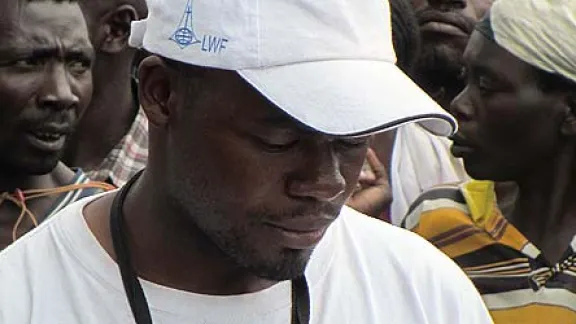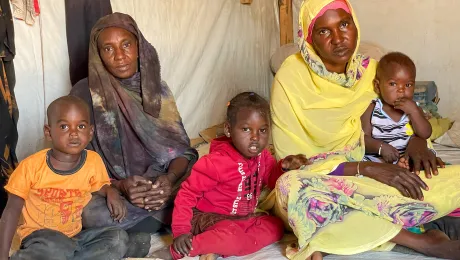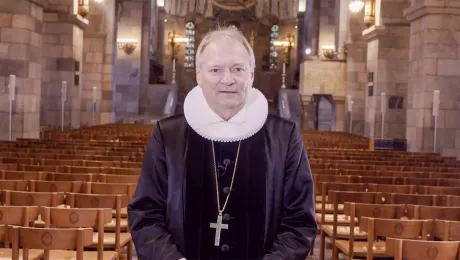
LWF team member Patrick Kalubi examines a list of names at a food distribution center in Goma, DRC. © LWF DRC/Fred Otieno
LWF Distributes Food at IDP Sites
Sitting on a sack filled with clothes on the back of a truck, nine-year-old Faustin flashes a smile.
“I’m happy because I will have a chance to go back to school where we live in Rutshuru. I hope to see my friends Antoine and Paul again,” he says as the truck begins to move, perhaps marking the end of his life in a camp for internally displaced persons (IDPs).
Faustin and his family were among the estimated 140,000 people displaced in November around the city of Goma, when a new wave of fighting flared up in the Democratic Republic of Congo (DRC) North Kivu province. The M23 rebels have conditionally pulled out of the Goma region, and some of the IDPs are beginning to return home. Peace talks between the DRC government and the rebels are going on in neighboring Uganda.
According to a 7 December report of the United Nations High Commissioner for Refugees (UNHCR) Internal Displacement Monitoring Center (IDMC), the power struggle between government troops and the M23 forces caused “massive population displacement and suffering.”
Faustin’s family was travelling back in a convoy of 11 trucks and 10 mini-buses that transported the first group of 750 voluntary returnees who had been staying at the Don Bosco Center in Goma. Pregnant and lactating mothers, people with disabilities and the elderly rode in the mini-buses, the rest sat on the backs of trucks.
The Lutheran World Federation (LWF) and partners in the ACT Alliance network have been supporting voluntary return of IDPS to their homes or to settlement centers. But the LWF has temporarily suspended the transport facilitation for voluntary returnees because of insecurity in some of the areas.
“The security situation is not encouraging for people to return to Kibumba, Rugare, Rumangabo, Kalengera and Kabaya areas north of Goma. Cases of women being raped have been reported. Men and boys feel threatened, as there are reports of young men being abducted by the rebels,” said Ms Mapendo, a displaced woman, after returning from an assessment visit facilitated by the LWF to her area of origin.
Emile Mpanya, the LWF representative in DRC and head of the Department for World Service (DWS) country program there participated in the 11 December joint assessment visit that also included the German Protestant aid agency Diakonie Katastrophenhilfe (DKH) and UNHCR to some of the places where IDPs are returning, especially north of Goma.
The LWF plans to provide returnees with seeds for planting and farm implements, as well as food distribution for three months.
Improved Humanitarian Access
Mpanya says the recent reopening of the Goma airport has improved the delivery of much-needed humanitarian aid but the nearby presence of the M23 soldiers continues to be a concern for air traffic. Road transport has resumed but in some areas, vehicles have to pay taxes when passing through the rebel-controlled sections.
In the southwest region of Masisi, the heavy presence of government troops in preparation for a possible advance towards Goma, has forced local residents to move in large numbers to the Mugunga and Lac Vert IDP camps, while others are accommodated in neighboring villages and host families in Goma.
Scarce Resources
The LWF has been supporting displaced people in the DRC since 1994, and is collaborating with other members of the global network of churches, ACT Alliance, in responding to the humanitarian crisis brought on by the recent fighting.
Intervention will continue through food distribution at several IDP settlements in partnership with the World Food Program (WFP), targeting an estimated 120,000 people. But there are shortages, Mpanya says.
Banzira Wkizum Wani has been sheltered at the Neema Primary School in the Majengo area of Goma with his wife and six children. “We are farmers. I used to grow enough food to feed my family, now we only share the little food given to us by the humanitarian agencies. I really wish I could return to my farm,” he says.
At the city’s Ushindi Primary School, where hundreds of families are temporarily staying, there is scarcity of clean drinking water. Thirty-year-old Bola Muhawe, a mother of six including a six-month-old infant, fled 48 kilometers from Rugare to Goma. “We have been here for more than a week but apart from the shelter, we have not received enough food yet. We have some lactating mothers,” she says.
The LWF teams conduct routine checks on the sites to determine the best intervention methods despite the scarcity of resources. They also ensure that peace and order are maintained in the displacement centers and that beneficiaries are served with dignity.
Yvonne Doudou does not hide her joy when she receives assistance at Don Bosco. “I now have something to feed my family for the next ten days or so,” she says, after receiving two sacks of maize and beans and five liters of cooking oil.
Mpanya hopes the rebels and government can reach an agreement “so that people can safely return to their homes.” (873 words)
(Written for LWI by Fred Otieno, DWS Kenya-Djibouti capacity building officer, on secondment to the DRC program.)


